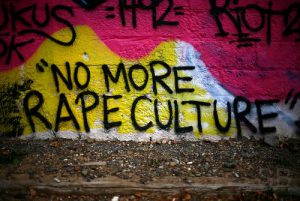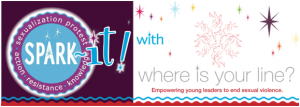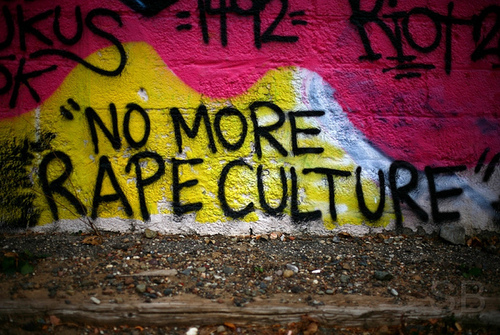By Crystal Ogar
 There’s a great campaign running in Scotland called “Not Ever.” It focuses on the rape culture and victim blaming. They have an amazing commercial on TV that features a woman at a bar with her friends and a man who says, “Check out her skirt, she’s asking for it.” The commercial then cuts to the same woman shopping for the new skirt when a saleslady approaches her and asks if she needs help. The woman then replies, “I’m going out tonight and I want to get raped. I need a skirt that will encourage a guy to have sex with me against my will.” Then, the saleslady picks the blue skirt. The point is very well taken: Nobody Asks To Be Raped.
There’s a great campaign running in Scotland called “Not Ever.” It focuses on the rape culture and victim blaming. They have an amazing commercial on TV that features a woman at a bar with her friends and a man who says, “Check out her skirt, she’s asking for it.” The commercial then cuts to the same woman shopping for the new skirt when a saleslady approaches her and asks if she needs help. The woman then replies, “I’m going out tonight and I want to get raped. I need a skirt that will encourage a guy to have sex with me against my will.” Then, the saleslady picks the blue skirt. The point is very well taken: Nobody Asks To Be Raped.
As I was doing my research for this blog, I found that many anti-rape campaigns and ads are mainly in the U.K. This definitely needs to change. How amazing would it be to see an ad like this one during primetime shows? Or better yet, in schools?
Rape Crisis Scotland, which created the commercial, is working towards getting the word out about rape and rape culture. On their website, they ask you to challenge yourself with an example of a very real situation: “At a night out at the pub with her friends, a woman meets a guy she likes. After chatting in the bar, he asks her to go back to his house – she goes. After another drink in his house, things get a bit passionate, but he then becomes forceful, leading to rape. Is the woman partly to blame for the rape?”
When you browse their site it gives you a 101 guide on how women are often blamed for their own rapes. Dress, alcohol, and intimacy are all covered — three topics that are often used in rape trials to blame a victim for her attack. There are even quizzes that test your knowledge about sexual violence. You can also have your say with discussions posted on the site with people from all over the world.
 Thankfully, we do have some United States-based organizations committed to empowering young leaders to create a world without sexual violence! The Line Campaign is a non-profit organization based in D.C. that partnered with SPARK to created a SPARKit about sexual consent. “Where Is Your Line?” encourages conversation and action about expressing yourself when it comes to sex. This activity is directed at youth to consider their own “line” and to create postcards to discuss and post on Flickr for others to see. (The SPARKit is free for all teachers, organizations and groups to download. It includes discussion questions, stickers, and a “how to” film with ideas on how you can SPARKit in your school or community! Download here.)
Thankfully, we do have some United States-based organizations committed to empowering young leaders to create a world without sexual violence! The Line Campaign is a non-profit organization based in D.C. that partnered with SPARK to created a SPARKit about sexual consent. “Where Is Your Line?” encourages conversation and action about expressing yourself when it comes to sex. This activity is directed at youth to consider their own “line” and to create postcards to discuss and post on Flickr for others to see. (The SPARKit is free for all teachers, organizations and groups to download. It includes discussion questions, stickers, and a “how to” film with ideas on how you can SPARKit in your school or community! Download here.)
Also, I love Hollaback!, which encourages women and LGBTQ to call out sexual harassment and catcalling they may encounter on the streets. By using their mobile devices, victims of this behavior can take pictures of the offenders and then post with stories on iHollaback.org.
In my opinion, it all starts with us. Like speaking out and talking back when we hear victims being blamed for assault. Talking about it. And choosing our “line.” It’s a small step, but who knows who you may impact by simply speaking up?
